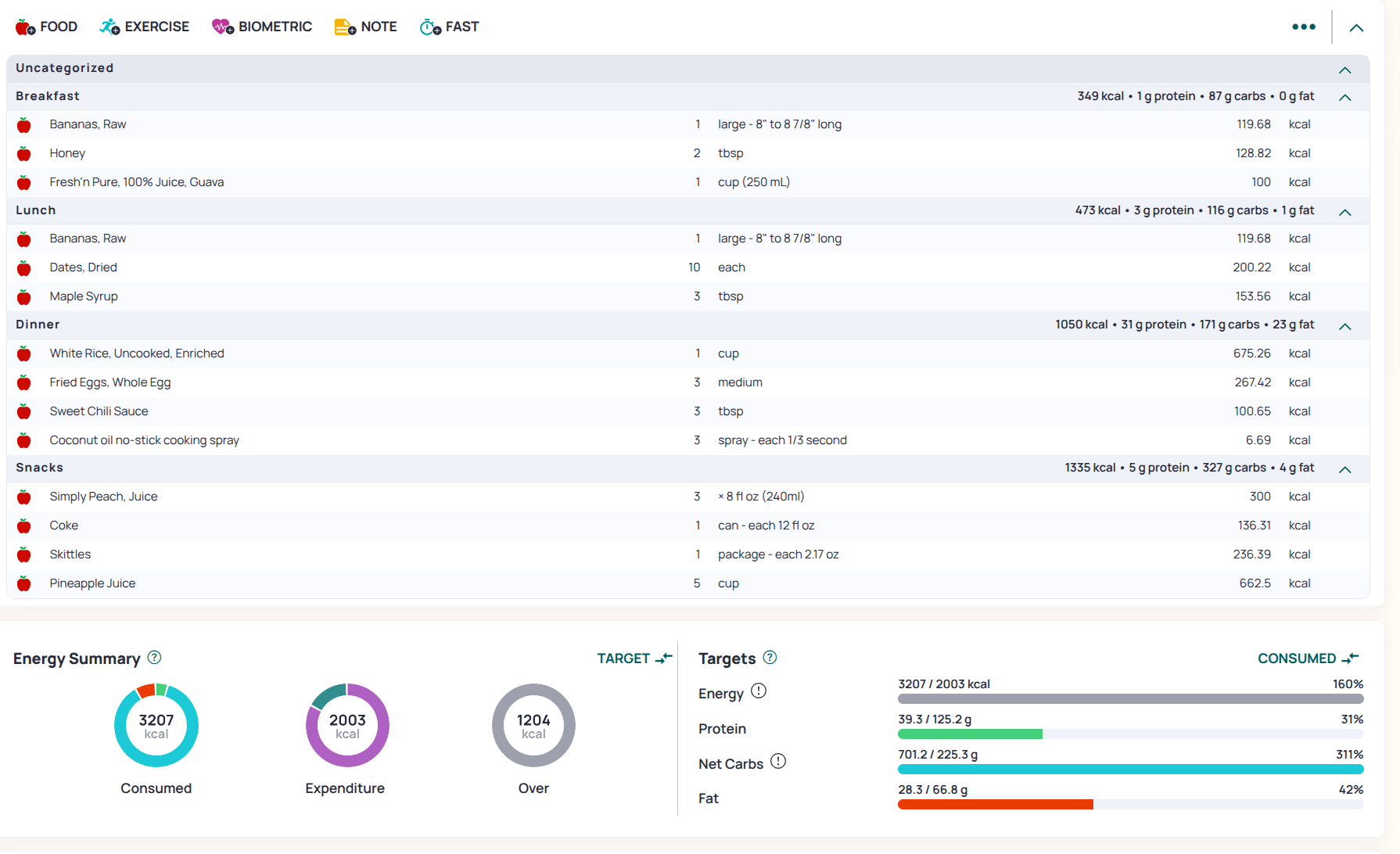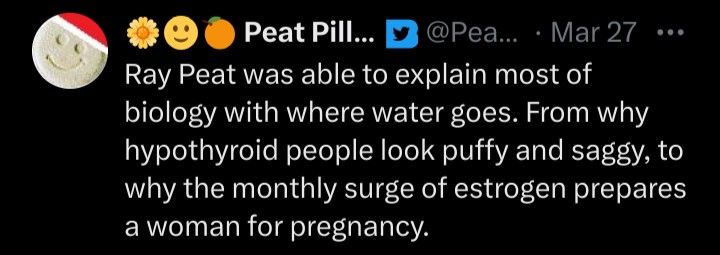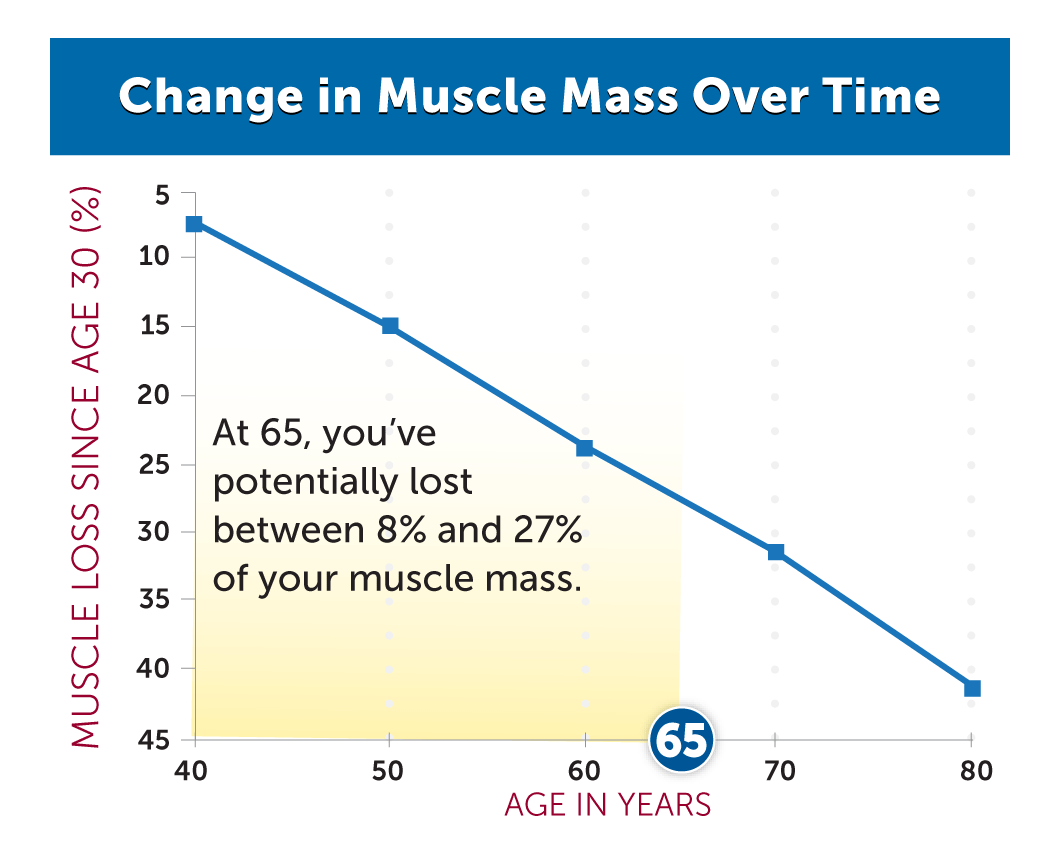Sugar Fasting General
-
Just starting this thread to discuss sugar fasting.
I'm currently eating sugar all day then <30g fat and <50g protein for dinner. Weight loss wise it has been pretty good. I lose around 2lbs/day! I think I need to lose around 40 lbs then I will be ripped. I feel more energetic but I'm still dealing with insulin resistance. I just don't get that burst of energy sugar gives to insulin sensitive people. I have been doing it for around 10 days. I took a couple days off last week as I felt a growing headache as well as my heart felt tired and heavy. I think the reason was just changing diet to radically. After eating some extra fat on those days I felt fine and now I don't have any of those problems.
Here is an example day. I will lay off the coke and skittles from now on.
I usually have 2 smoothies and plenty of juice then for dinner rice, chicken breast or eggs.

-
Good thread. Good experiment.
@Kilgore said in Sugar Fasting General:
I took a couple days off last week as I felt a growing headache as well as my heart felt tired and heavy. I think the reason was just changing diet to radically.
You're right.
Maybe I should put this in a separate thread, but why. Why would shifting a macro/substrate too quickly do something like this.
@Kilgore said in Sugar Fasting General:
I feel more energetic but I'm still dealing with insulin resistance. I just don't get that burst of energy sugar gives to insulin sensitive people.
Maybe the answer contains the answer.
@bot-mod said in Why Does Wine Help with preventing Nighttime urination?:

I wonder what "keto >>>flu<<<" really is. And more subtle or persistent manifestations of similar phenomena.
@ThinPicking said in Effect of 8.4% Soda-Bicarbonate Steam Inhalation on the Course of Disease in Mild to Moderate Cases of Covid-19:
-
@Kilgore said in Sugar Fasting General:
After eating some extra fat on those days I felt fine and now I don't have any of those problems.
Hi,
I know high carb diet is appreciated by a lot of people when they want to optimize energy.
However, there are some elements we have to point out if we want to metabolize well and avoid long-term side effects.
Too much of a good thing is bad. Why? This figure is more explicit than an explanation:
Figure: Crowded metro & impaired glucose uptake

Insulin resistance impairs glucose disposal, resulting in a compensatory increase in beta-cell insulin production and hyperinsulinemia. At first phase. Insulin is then unable to play its role when glucose can’t reach the muscle. This situation is often present when there is fat round the muscles. Another one is with a fatty liver (tired to produce the right amount of insulin).
doi: 10.1002/cphy.c190029 NIH 2021. Role of Skeletal Muscle in Insulin Resistance and Glucose Uptake.
NB: Metformin is not going to solve the problem but well to gain 10 years before DT2.When trying to lose weight I’d target the following points:
- Minimum 20 % fat. Problems with +/ 10% for thermoregulation, hormones and liposoluble vitamins.
- 1.2 g /kg weight for proteins. Not to lose muscles, the target of protein is higher than the usual 0.8 g recommended. If not taken into account, when losing weight, 2/3 are water lost.
NB: Most people are unable to assimilate more than 35 g protein in one take. If you eat 50 g protein, you’d better fraction it in two parts. Otherwise 15 g is taking the fatty way (not enough digestive enzymes). - I’d rather follow a 5.2 diet with a schedule 16.8 and trying to get at least 80 % of my needs to avoid a brain reaction (slower metabolism).
So, I don’t eat after 8 o’clock PM till 12 a.m. next day. Or 10 a.m. if too difficult, at the beginning.
There are a lot studies demonstrating it’s fine for the brain. You mimic the starving process, without side effects.
Second, 2 days/wk. I’d eat between 1200 – 1600 K/cal. Not two days in a row. If there is an unforeseen event or an “infraction”, we postpone, but not on the next day. We avoid stressing out, otherwise we will end up with bad fat (AA release).
So 2 meals. One with a mixed salad (with an apple or a tomato) and a white fish. Another meal with a green soup and 2 eggs. A carrot salad with olive oil or ½ avocado could be eaten if too difficult.
If no white fish, beef or shrimps could be taken.
Hope it can help.
Edit: We’re not talking about a 4-5 days fasting, with only water.
-
@Kilgore wouldnt it make more sense to eat protein in the morning ?
-
@LucH said in Sugar Fasting General:
Too much of a good thing is bad. Why? This figure is more explicit than an explanation:
Figure: Crowded metro & impaired glucose uptake

Figure: Hypothetical interstitial fluid disaster

Figure: Advanced Japanese third space & renal system

-
@lobotomize-me The goal of this diet (the "honey diet") is to maximize the production of the FGF21 hormone. FGF21 plays an important role in regulating glucose and lipid metabolism. Some studies show that when you eat carbs with protein you reduce FGF21 the most, if you eat carbs with fat you reduce it a little and if you just eat carbs you spike it right up. So that's why no protein till dinner.
-
@Kilgore won't this FG21F stabilize though after reducing sugar and going to a more balanced diet?
-
@lobotomize-me said in Sugar Fasting General:
@Kilgore wouldnt it make more sense to eat protein in the morning ?
My understanding is blood sugar is usually low upon waking. I don't like a lot of protein unless I'm really hungry or going to do a lot of work, otherwise high carb is better for breakfast.
-
-
@Kilgore said in Sugar Fasting General:
The goal of this diet (the "honey diet") is to maximize the production of the FGF21 hormone.
One of the effects of FGF21 is muscle atrophy. I use a 'smart scale' (biometric scale) to monitor my muscle mass. The idea that fast weight loss may be 30% muscle loss is unacceptable for me. It seems to me to be a setup for injury/falls and sarcopenia.
Our findings reveal a novel role and heretofore unrecognized mechanism of FGF21 in skeletal muscle atrophy, suggesting that inhibiting muscular FGF21 could be a promising strategy for mitigating skeletal muscle atrophy.
-
@alfredoolivas and James whose @ isn't there both are right, sugar fasting is weird its better to just do a normal low fat diet
you aren't really even doing a sugar fast anyways
a sugar fast is pure carbohydrate diet with only trace fats that are naturally present in foods that aren't fat foods like eggs -
@lobotomize-me said in Sugar Fasting General:
@Kilgore wouldnt it make more sense to eat protein in the morning ?
I am in the protein in the morning camp. I generally stop eating 2 hours before bedtime and I do not eat during my sleep. I am do not know how long the protein effect on FGF21 lasts, but I typically do not eat more protein until evening. So 2 spikes of protein during a 24 hour cycle may not be too bad for FGF21.
-
@DavidPS said in Sugar Fasting General:
One of the effects of FGF21 is muscle atrophy.
That may be an ill conceived goal for hyperchill cube occupiers. One group in particular.
-
-
@ThinPicking said in Sugar Fasting General:
@DavidPS said in Sugar Fasting General:
One of the effects of FGF21 is muscle atrophy.
That may be an ill conceived goal for hyperchill cube occupiers. One group in particular.
A quick search will reveal other studies of FGF21 and muscle atrophy.
I have been tracking my muscle mass and bone mass for a number of years and they have not declined. Environmental factors can forestall the typical decline or accelerate the typical decline.

-
@LucH said in Sugar Fasting General:
When trying to lose weight I’d target the following points:
Minimum 20 % fat. Problems with +/ 10% for thermoregulation, hormones and liposoluble vitamins.
1.2 g /kg weight for proteins. Not to lose muscles, the target of protein is higher than the usual 0.8 g recommended. If not taken into account, when losing weight, 2/3 are water lost.
NB: Most people are unable to assimilate more than 35 g protein in one take. If you eat 50 g protein, you’d better fraction it in two parts. Otherwise 15 g is taking the fatty way (not enough digestive enzymes).
I’d rather follow a 5.2 diet with a schedule 16.8 and trying to get at least 80 % of my needs to avoid a brain reaction (slower metabolism).
So, I don’t eat after 8 o’clock PM till 12 a.m. next day. Or 10 a.m. if too difficult, at the beginning.
There are a lot studies demonstrating it’s fine for the brain. You mimic the starving process, without side effects.
Second, 2 days/wk. I’d eat between 1200 – 1600 K/cal. Not two days in a row. If there is an unforeseen event or an “infraction”, we postpone, but not on the next day. We avoid stressing out, otherwise we will end up with bad fat (AA release).
So 2 meals. One with a mixed salad (with an apple or a tomato) and a white fish. Another meal with a green soup and 2 eggs. A carrot salad with olive oil or ½ avocado could be eaten if too difficult.
If no white fish, beef or shrimps could be taken.
Hope it can help.
Edit: We’re not talking about a 4-5 days fasting, with only water.
What is this write up man? I thought you were one of the higher IQ people on here. Now I'm not sure. Im shocked by this seriously.
Caloric restriction?
Intermittent fasting?
FIVE HUNDRED CALORIE days?
Dont eat till 12PM/10AM?
Mimic the starving process WITHOUT side effects?
Anorexic emo eating disorder girl mealplans?Are you serious?
I can't believe this. I am genuinely shocked! I took so long to respond because my brain froze from this boomer coded normie response. What the hell?For your reference, 2 years ago I did 16:8 IF, over the summer, with caloric restriction. I have lost about 20-30 pounds while also spending 4-5 hours a day walking. Then the weight loss plateaued. Also, what I did not know back then was that I nuked my thyroid with this behavior, had zero energy, I could sleep under my winter blanket and still feel cold. I prefer to not repeat that again.
-
@Kilgore said in Sugar Fasting General:
I can't believe this. I am genuinely shocked! I took so long to respond because my brain froze from this boomer coded normie response. What the hell?
No offence to @LucH. I couldn't selectively paraphrase in French without 365 solid days of practice.
Back in reality. A human selectively paraphrasing AI, sparing the energy to manipulate your boss may replace you if they're a prick. In which case they'll be needing robotic botox and a stent.
-
I think people who have trouble with (intermittent) sugar fasting just need to widen their sources of sugar. Body is not designed to eat the same things all the time. You need fruit, you need juice, you need sweets, you need honey, you need sirup, not just one thing at once. And even then you need at least one non-sugar meal per day.
-
@Kilgore
I didn’t say to eat 5-600 K/cal. as often read in a 5.2 diet. You’ve well done to attract the attention that when starving the body you could depress the metabolism (brain and thyroid). Always listen to the body reaction and adapt if required, otherwise metabolism will slow down (spare mode).
If we except people with glycemia problems, who shouldn’t follow a low-calorie diet, I said we shouldn’t eat less than 80 % of our needs, on a regular basis. Or you’ll pay it soon or later, with a lack of essential nutrients, on top of that. The problem is not to lose weight, but not to regain the lost weight and gain more on top of it as in 90% of cases.
So to be clear, what I mention:
a) 5 days, I advise to eat / take your usual intake. 100%
Mind the breakfast / the first meal as the insulin reaction of the first meal is going to impact the rest of the day.
If you eat less – no matter why – which I do not advise (no need here to lose weight), don’t eat less than 80 % of you metabolic needs (metabolism + physical expenditure). Focus then on nutrient-dense foods.
b) 2 days a week (not in a row) between 1200-1600 K/cal. So usually 2 meals.
Why this level and not 5-600 K/cal., as often read. Our 3 mains organs require that amount to function well (liver, hart & brain).
Note: If we combine 5.2 with 16.8 – what I try when want to lose excess weight (> 23 BMI), it’s ideal to take advantage (1)
NB: Most of us will have to make staples, to reload energy or to make it easier when encounting a Herxheimer reaction (detox reaction).
It's also normal to stall at some point during weight loss. 2 to 3 weeks is quite common. Don't rush things, or your brain will make you pay (slow-down mode). At that moment, 8-10 days after a pause, you can exercise, but in cardio mode, not in high intensity. For instance bike, quick walk (6 – 8 Km/H) or swimming.
A dynamic pace but manageable over a long distance (30 minutes). Avoid exceeding 120-140 heart rates (80% of MHR)
MHR: 220 – age.
For beginners, and to obtain a more accurate measurement, it is recommended to perform a supervised stress test.Sources and References
- The 16:8 diet, an intermittent fasting method, can potentially offer several brain-related advantages by promoting metabolic switching and autophagy, a cellular cleanup process. These mechanisms may enhance brain resistance to stress, improve cognitive function, and potentially slow down age-related cognitive decline.
Counter-indication: glycemia problems and brain disturbances (emotional instability). - Mark Mattson, senior investigator for the National Institute on Aging, which is part of the US National Institutes of Health (NIH), has researched the health benefits of intermittent fasting, as well as the benefits of calorie restriction. According to Mattson, there are several theories to explain why fasting works:
http://fitness.mercola.com/sites/fitness/archive/2013/06/28/intermittent-fasting-health-benefits.aspx?e_cid=20130628_DNL_art_1&utm_source=dnl&utm_medium=email&utm_content=art1&utm_campaign=20130628#_edn6
Note (LucH): I don't take Dr. Mercola's advice for granted. Too biased. Not suitable for everyone.
*) The Health-Promoting Effects and the Mechanism of Intermittent Fasting
J Diabetes Res. 2023 doi: 10.1155/2023/4038546
Health Benefits of IF
IF can trigger autophagy, a cellular process that helps remove damaged cells and promotes tissue regeneration, potentially contributing to longevity and disease prevention.- Insulin sensitivity (HbA1c)
- Weight Loss by people with high BMI
- Reduced Inflammation (improving gut health and a healthy gut microbiome)
- Cellular Repair and Protection
*) Health Benefits of Intermittent Fasting
Microb Physiol 2024. https://doi.org/10.1159/000540068
There are many benefits in losing weight; boosting immunity; countering the risks of diabetes, cancer, and cardiovascular diseases; and slowing the process of ageing. IF studies in animal models suggest that the process induces longevity, improve metabolic health, and positively influences hormonal changes. IF also seems to influence inflammatory reactions, lipid metabolism, and insulin sensitivity.Other sources
CMAJ April 8, 2013
http://www.cmaj.ca/site/earlyreleases/8apr13_intermittent-fasting-the-science-of-going-without.xhtml
Prostate Cancer Prostatic Diseases 2010;13:350-5
http://www.nature.com/pcan/journal/v13/n4/full/pcan201024a.html
CMAJ March 20, 2013
http://www.cmaj.ca/content/early/2013/03/25/cmaj.109-4437
Eurekalert, Study finds routine periodic fasting is good for your health, and your heart, April 3, 2011
http://www.eurekalert.org/pub_releases/2011-04/imc-sfr033111.php
Free Radical Bio Med 2007;42:665-74
http://www.sciencedirect.com/science/article/pii/S089158490600801X
International Journal of Obesity 2011;35:714-27
http://www.nature.com/ijo/journal/v35/n5/full/ijo2010171a.html
Washington Post December 31, 2012
http://www.washingtonpost.com/national/health-science/fasting-may-protect-against-disease-some-say-it-may-even-be-good-for-the-brain/2012/12/24/6e521ee8-3588-11e2-bb9b-288a310849ee_story.html?tid=wp_ipad - The 16:8 diet, an intermittent fasting method, can potentially offer several brain-related advantages by promoting metabolic switching and autophagy, a cellular cleanup process. These mechanisms may enhance brain resistance to stress, improve cognitive function, and potentially slow down age-related cognitive decline.